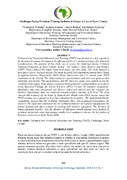| dc.contributor.author | Kagema, Josephat | |
| dc.contributor.author | Wanjohi, E. Waihura | |
| dc.contributor.author | Kimiti, Richard | |
| dc.contributor.author | Kimosop, Maurice | |
| dc.date.accessioned | 2019-12-04T14:01:26Z | |
| dc.date.available | 2019-12-04T14:01:26Z | |
| dc.date.issued | 2019-09 | |
| dc.identifier.citation | African Journal of Education, Science and Technology, September, 2019, Vol 5, No. 2 | en_US |
| dc.identifier.uri | https://karuspace.karu.ac.ke/handle/20.500.12092/2365 | |
| dc.description.abstract | Technical and Vocational Education and Training (TVET) was deemed as a key ingredient for Kenyans Economic development by offering mid-level technical managers for industrial transformation. The purpose of this study was to assess the challenges facing Technical Training Institutions in Nyeri County, Kenya. The Context, Input, Process and Product (CIPP) Theory formed the major theoretical framer for this study. The study adopted a descriptive survey research design. The study targeted 330 respondents among them Heads of Applied Sciences Department, Field Intern Supervisors and 275 interns from TVET institutions in the County. The study employed a questionnaire and interview guide as data collection instruments. The questionnaire and the interview guide were piloted to test for reliability and validity. Data analysis employed both quantitative and qualitative procedures using Statistical Package for Social Sciences (SPSS) Version 19 computer programme. Qualitative data was categorised into themes, coded and entered into the computer for analysis. Quantitative data was analysed using descriptive statistics (Chi-Test). The study showed that majority of the Head of Departments (HoDs) and TVET interns noted that TVET training was regarded as low-class education by the public. The study found that the respondents agreed that the technical institutions have well organized programmes for learners. The study also concluded that the technical institutes were poorly equipped for the market demand and often resulted in training with obsolete equipment. The Ministry of Industrialization together with the Ministry of Education should allocate more funding to technical institutions since they prepare middle level employees who are the key pillars of Kenyan’s achievement of the Vision 2030. | en_US |
| dc.language.iso | en | en_US |
| dc.publisher | African Journal of Education, Science and Technology | en_US |
| dc.subject | Technical and Vocational Education and Training (TVET | en_US |
| dc.subject | Challenges | en_US |
| dc.subject | Nyeri County | en_US |
| dc.title | Challenges Facing Technical Training Institutes in Kenya: A Case of Nyeri, County | en_US |
| dc.type | Article | en_US |
